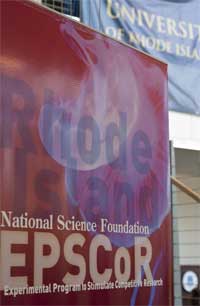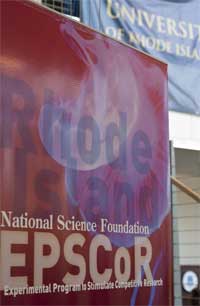 Funding intended to strengthen state’s research competitiveness, support workforce development
Funding intended to strengthen state’s research competitiveness, support workforce development
KINGSTON, R.I. – September 7, 2010 – The National Science Foundation has awarded the University of Rhode Island a $20 million grant designed to stimulate research in marine life science at nine of the state’s institutions of higher education. The funding builds on previous NSF support and is intended to strengthen the state’s research competitiveness and productivity, fund outreach and workforce development initiatives, and increase career pathways in science, technology, engineering and math.
The state, through the Rhode Island Economic Development Corporation (EDC), has also committed $4 million in cost-sharing over the five-year period.
“This EPSCoR funding is a landmark grant for the University and for the State of Rhode Island that will help propel us into national prominence in marine life science research and development,” Gov. Donald L. Carcieri said. “The funding will strengthen the vital link between education and workforce development in our growing innovation economy.”
“This grant is a smart investment in Rhode Island that will strengthen the state’s research and development competitiveness, foster economic growth, and help create jobs now and in the future,” said U.S. Senator Jack Reed (D-RI), who was instrumental in passing federal legislation to make the state eligible for EPSCoR and supported Rhode Island’s EPSCoR application.
URI President David M. Dooley stated, “The funding will continue to build the infrastructure to enable us to work on some of the most pressing issues of our time and conduct science that is of broad societal interest. It will allow us to take advantage of Rhode Island’s unique niche and resources, positioning the Ocean State as a leader in understanding and predicting how marine organisms and ecosystems respond to climate change. “
“The economic development benefits resulting from this grant are significant,” said Peter Alfonso, URI vice president for research and economic development and the principal investigator for the grant. “We will acquire high tech equipment that will enable us to compete for more and larger grants in the future, and we will provide jobs and training for hundreds of students, lab technicians and others for the next five years.
“What we get is a much more modern infrastructure support system that modern science actually requires,” said Alfonso. He noted that NSF awarded URI the maximum grant amount, and the funding is the single largest grant in URI history.
URI has received previous awards through NSF’s Experimental Program to Stimulate Competitive Research (EPSCoR) totaling more than $8 million since 2006. The funding has resulted in measurable progress toward building research capacity and competitiveness in Rhode Island, helping investigators statewide secure $32 million in grant awards for research in marine life sciences.
URI is the project lead on the new grant and works in collaboration with a statewide network made up of Brown University and the Rhode Island School of Design, co-PI’s on the grant; Bryant University, the Community College of Rhode Island, Providence College, Rhode Island College, Roger Williams University and Salve Regina University.
“Support from this award will augment critically important cyberinfrastructure,” said Edward J. Wing, MD, dean of Medicine and Biological Sciences at Brown University. “ Together with recent investments by Brown University in high-performance computing, this award illustrates the power of partnerships to optimize our intellectual and other resources for the benefit of the state. As co-PI and project director Professor Edward Hawrot will provide the critical leadership from Brown that is needed to help advance this project.”
Also of particular note is a new partner, the Rhode Island School of Design, which will investigate innovative approaches to imaging data and communicating science through its “Making Science Visible” initiative, which uses two-and three-dimensional modeling and mapping processes. RISD will also establish a series of collaborative studios and academic events in which scientists can collaborate with artists and designers to explore complex problems.
“This project will provide a platform for engaging the widest possible range of scientists, artists, and designers around the pressing issues of understanding and communicating the impacts of climate change,” said David Bogen, associate provost for Academic Affairs at RISD.
The EPSCoR funding will provide for new laboratory equipment at the Center for Marine Life Science (at the URI Narragansett Bay Campus), the Genome Sequencing Center (at the URI Kingston Campus), and the Proteomics Center (at Brown University). The funding will also support 37 graduate and 165 undergraduate students.
Scientists in the state will be able to develop larger research programs and more extensive collaborations. The initiative will also increase the exposure of underrepresented populations to opportunities in marine sciences, life sciences, and associated high tech careers in general.
The Rhode Island EPSCoR Academy, which was established through the 2006 grant, will be able to enhance its enrichment, tutoring and professional development programs for middle and high school students and teachers. It will also provide 11 two-year graduate research fellowships, and 25 entrepreneurial fellowships. The Academy, which includes all nine institutions and the Slater Technology Fund, supports graduate fellowships at URI, Brown and Rhode Island College, and creates networking opportunities for faculty and students to enhance collaboration.
Researchers will examine the physiological changes taking place in some marine species, explore how climate change is altering coastal marine food webs, and investigate whether increasing ocean temperatures will increase infection and disease rates among marine populations. Rhode Island is in an exceptional position to undertake this research because of its long-term historical data on the biology and chemistry of Narragansett Bay.
EPSCoR is a program designed to assist those states that have historically received less than 0.75 percent of NSF research funding annually. In 2006, the first grant established the three shared research facilities for genomics, proteomics and marine life sciences, including the purchase of equipment and the hiring and training of key personnel and graduate students at various Rhode Island academic institutions.
“The first EPSCoR grant created a platform to launch this next grant,” said Jennifer Specker, a URI professor of oceanography who will serve as the associate project director for the grant and is director of the EPSCoR Center for Marine Life Science. “We can now capitalize on the infrastructure that we acquired from the first grant and work together on how marine organisms will adapt to climate change and the impact on Narragansett Bay and our watershed.”

